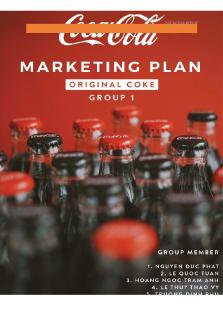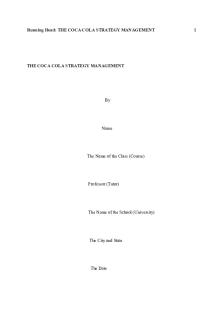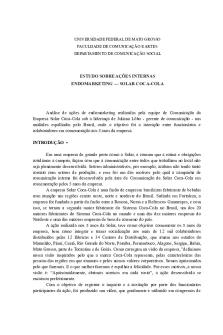Coca Cola Sustainability PDF

| Title | Coca Cola Sustainability |
|---|---|
| Course | Sustainable Management |
| Institution | Conestoga College |
| Pages | 11 |
| File Size | 143.7 KB |
| File Type | |
| Total Downloads | 36 |
| Total Views | 165 |
Summary
essay...
Description
1
The Coca-cola Company Sustainability Analysis Group Members: 1. 2. 3. 4. Course section: Course Name Instructor’s Name Date
2
Table of Contents Executive Summary.........................................................................................................................3 Introduction......................................................................................................................................4 Company Profile..........................................................................................................................4 Concept of Sustainability.............................................................................................................4 Sustainability in the U.S. 5 Drivers of Sustainability and Metrics of Measurement...............................................................5 Sustainability Programs and Policy.............................................................................................6 Economic/Profit........................................................................................................................6 Environmental/Planet...............................................................................................................6 Social/People............................................................................................................................7 Sustainability in Japan.....................................................................................................................7 Drivers of Sustainability and Metrics of Measurement...............................................................7 Sustainability Programs and Policy.............................................................................................8 Economic/Profit........................................................................................................................8 Environmental/Planet...............................................................................................................8 Social/People............................................................................................................................8 Sustainability in Canada..................................................................................................................8 Drivers of Sustainability and Metrics of Measurement...............................................................8 Sustainability Programs and Policy.............................................................................................9 Economic/Profit........................................................................................................................9 Environmental/Planet...............................................................................................................9 Social/People............................................................................................................................9 Comparison of Sustainability Efforts..............................................................................................9 Conclusion.....................................................................................................................................10 References......................................................................................................................................11
3
Executive Summary Since its incorporation in 1892, the Coca-Cola Company has grown to become a globally renowned beverage company. The company runs on a franchised distribution channel that constitutes multiple independent bottling companies across the globe. This report presents a breakdown of how the Coca-Cola Company ensures sustainability in three different countries, the USA, Japan and Canada. The report presents a discussion of the drivers and motivations for sustainability in the three countries, the metrics of measurement, and the different sustainability programs the company implements in the three countries. It focuses on three significant aspects of sustainability; profit, planet and people. The report highlights different drivers for sustainability, including:
Growing climate change concerns such as water and waste pollution
Changing preferences and lifestyles among customers
The Corporate Social Responsibility Mandate for production productions
The report also outlines different sustainability programs that the Coca-Cola Company implements in the three countries. Some of the sustainability programs implemented are:
Diversification of product ranges to satisfy customer preferences and generate additional revenue.
Implementation of waste management strategies under the “World Without Waste” program
Efficiency in water usage through re-use and recycling incentives
Promotion of diversification in the workplace
Engagement in various community programs
Empowerment of women under the “5 by 20” program
Thus, the report reveals that the Coca-Cola Company is dedicated to business sustainability in all the three countries profiled in the analysis. The company has independent quality standards that it uses to assess its sustainability progresses. It also uses the SDGs outlined by the United Nations as a checklist for its sustainability efforts.
4
Introduction Company Profile The coca-cola company is a multinational American Corporation that has been operational since 1892. The company's headquarters are located in Atlanta, Georgia, in the United States. After a pharmacist called John Stith Pemberton came up with the Coca-Cola beverage formula during one of his experiments in 1886, the company came into existence (Coca-colacompany.com, 2020). In 1889, Asa Griggs Candler purchased the Coca-Cola formula and brand at $2,300. Candler later incorporated the present-day Coca-Cola Company in 1892 and registered the trademark "Coca-Cola" in 1893 with the United States Patent Office. Under Candler's leadership, the company established its base, with the total sales rising from 9000 gallons to 370,877 gallons between 1890 and 1900 (Bellis, 2020). In 1899, Coca-Cola agreed with a bottling company, permitting the company to buy the beverage syrup, bottle, and distribute the Coca-Cola beverage. The 1899 agreement marked the birth of the Coca-Cola Company's unique franchised distribution system. The company was later bought off by agroup of investors led by Ernest Woodruff in 1919 at a cost of $25 million. Coca-Company is responsible for producing syrup concentrate, which it then sells to independent bottling companies across the globe. The different bottling companies each hold exclusive territories within which they operate. Through the years, the company has expanded its operations by venturing into new areas and introducing different beverage brands like Fanta, minute maid and, most recently, Coca-Cola Zero along with energy drinks and enhanced waters. Today, it operates in over 200 countries globally, offering close to 500 beverage brands Cocacolacompany.com, 2020). The company's beverage brands are classified into different clusters, such as soft drinks, sports drinks, juice, and energy drinks. It is also ranked as the world's number one producer of non-alcoholic beverages. The Coca-Cola Company seeks to maintain its legacy by shifting to promoting heather lifestyles among its customers through the introduction of healthy beverage products. Concept of Sustainability The concept of sustainability can be defined from different viewpoints, depending on the underlying aspects. From a business perspective, sustainability refers to activities aimed at satisfying the present needs without jeopardizing future generations' ability to meet their needs.
5
The concept constitutes three aspects: economic, environmental and social, often referred to as profits, planet, and people, respectively (Mason, 2020). Sustainability prompts companies to align their decisions towards achieving the three aspects of sustainability. Sustainability compels businesses to focus on broader issues beyond just profitability or other economic benefits. Companies have thus been forced to come up with sustainable programs to ensure global achievement of sustainability. As the globe moves towards achieving sustainability, the food and beverage sector has witnessed an intensification of sustainability measures. The shift has been prompted technology and the rise in demand for environmentally conscious products and practices among customers. The food and beverages industry has also been forced to rethink their strategies because of climate change's growing concerns. The implementation of sustainability by food and beverage companies entails the integration of an exclusive green strategy within the supply chain system (Richter, Yehezkel & Ben-Moussa, 2019). The companies have been compelled to ensure sustainability in packaging, energy consumption, and raw ingredients. Sustainability in the food and beverage sector also entails using alternative energy resources, reducing carbon emissions, and proper water usage (Richter et al., 2019). This paper presents an analysis of how the CocaCola Company implements the sustainability requirements for food and beverage companies. The report will focus on three countries in which the company operates: the United States, Canada and Japan. It highlights the different strategies the company adopts in each of the three countries and concludes with a comparison of the three nations' initiatives.
Sustainability in the U.S. Drivers of Sustainability and Metrics of Measurement The Coca-Cola Company implements various sustainability incentives within the United States of America. The company’s move to adopt sustainable business approaches has been prompted by different categories of both internal and external business drivers. In the first case of environmental sustainability, the Coca-Cola Company has been forced to adopt sustainable measures to comply with the provisions Environmental Protection Agency (EPA). EPA emphasizes the importance of efficient use of energy and water resources and efficient waste management (Saeed & Kersten, 2019).
6
The Coca-Cola Company is also driven to ensure sustainability due to the customers' changing needs and preferences. Many people have recently resorted to upholding a healthy lifestyle (Olayanju, 2019). Thus, most people prefer products with low sugar and calorie content, compelling the Coca-Cola Company to rethink its business strategy. The final driver for the Coca-Cola Company sustainability incentives is the corporate social responsibility (CSR) mandate. CSR requires that companies be answerable to the communities by coming up with different community programs. They use different metrics at the Coca-Cola Company to gauge its performance on its sustainability goals within the USA. In the first case of water and energy resources, the Coca-Cola Company assesses its performance by comparing its overall energy and water consumption. It also evaluates its performance by an overview of its total sale of ecofriendly products and its CSR programs' outcomes. Sustainability Programs and Policy a. Economic/Profit In the U.S., the Coca-Cola Company has ensured economic sustainability by generating more revenues through diversification. Over the years, Coca-Cola has succeeded in adapting to the changing market trends by effectively responding to the changing preferences among consumers. Coca-Cola acknowledges the healthy lifestyle revolution among most Americans and has devised ways to help its customers stay loyal. Coca-Cola has since introduced sugar-free drinks to help cover a broader market of consumers. The Coca-Cola Company has also responded to the increasing health concerns by introducing healthy organic products within the U.S. market (Al Tunaiji, 2019). The diversification in its products has thus seen the company generate more revenues from the new organic product range. b. Environmental/Planet The Coca-Cola Company in the USA is dedicated to environmental sustainability through the effective use of resources and proper waste management. The company practices waste recyclability through the program termed "World Without Waste.”. The company implements its waste management program through three distinct strategies. The first is through designing and creation packaging, which constitutes about 50 percent of recycled materials (Karas, 2018). The second strategy is to collect and recycle its primary packaging, and finally, by partnering with communities to achieve a healthy and waste-free environment. The company also ensures
7
environmental sustainability through the water recycling program. The company also ensures that the wastewater it releases back to the environment treated and safe. Part of the firm's environmental sustainability is through promoting sustainable agriculture through sustainable sourcing of production materials. c. Social/People The Coca-Cola Company is also dedicated to achieving social sustainability by implementing an effective CSR program. It promotes diversity and inclusivity in the workplace to give everyone an equal opportunity to perform their tasks to the best of their capability. The company also supports local communities by investing 1% of its annual incomes into different community programs. The company also supports women empowerment through the "5by20" program (Coca-colacompany.com, 2020).
Sustainability in Japan Drivers of Sustainability and Metrics of Measurement In Japan, the Coca-Coca Company operates under the trade name "Coca-Cola Japan." The company is motivated to uphold sustainability through various underlying factors. One of the elements is the rising concerns if climate change, prompting the company to ensure environmental sustainability in its operations. Coca-Cola Japan is also driven to ensure sustainability because of the changing preferences of customers. The company's sustainability programs are also inspired by the corporate social responsibility agreements among the bottling partners within Japan. Coca-Cola Japan measures its progress on the sustainability goals using different metrics. Product quality is measured using the global standards provided by the CocaCola Company, referred to as the Coca-Cola Operating Requirements abbreviated as KORE (Coca-Cola Japan-Sustainability Report, 2018). In addition to the KORE standards, Coca-Cola Japan uses the United Nations SDGs as a checklist to assess its sustainability progress. Sustainability Programs and Policy d. Economic/Profit Coca-Cola Japan ensures economic sustainability by providing various products that suit the varying lifestyles of the consumers. The company also makes efforts to offer the consumers
8
with relevant information on the beverage products. Coca-Cola Company also supports its customers to achieve active and healthy lifestyles. The company provides close to over 800 product ranges in Japan, classified into more than 50 brands (Coca-Cola Japan-Sustainability Report, 2018). It is the nation’s leading beverage company in terms of sales volume of soft drinks, sparkling beverage, coffee and sports drinks. Coca-Cola Japan is also the number one company regarding the total number of vending machines deployed across the nation. e. Environmental/Planet Coca-Cola Japan implements various environmental sustainability programs. A major ecological program is the company's water recycling program in which it seeks to return water amount equivalent to what it uses in its production process. In 2017, the company managed to return 241 percent of the total water used in the production process. The company is also dedicated to achieving energy and climate sustainability through initiatives to reduce its carbon footprint. Coca-Cola Japan also ensures environmental sustainability through sustainable packaging and the use of sustainable agricultural products in its production process. f. Social/People Coca-Cola Japan is also committed to social sustainability through involvement in different community activities. The company lives up to its CSR mandate by supporting various community programs such as women empowerment. Coca-Cola Japan also actively engages in different community activities such as forest conservation and environmental cleanup (CocaCola Japan-Sustainability Report, 2018). The company also focuses on the creation of a positive working environment suitable for people from diverse backgrounds.
Sustainability in Canada Drivers of Sustainability and Metrics of Measurement In Canada, the Coca-Cola Company operates under the trade name "Coca-Cola Canada." The company is motivated to promote sustainability in its operations because of different factors. One of the drivers is the government guidelines requiring that companies cut down on their total carbon footprint. Coca-Cola Canada has also embraced sustainability in response to the growing climate change concerns because of waste and water pollution. A final driver of viability for
9
Coca-Cola Canada is the CSR mandate of all companies operating within Canada. The company gauges its sustainability progress by using the United Nations' SDGs as a checklist. Sustainability Programs and Policy g. Economic/Profit Coca-Cola Canada implements economic sustainability by providing diverse product ranges to satisfy the varying preferences of the consumers (Coca-Cola Canada, 2020). The company also makes sure to give the consumers on all the relevant information on the products. It also helps consumers maintain healthy and active lifestyles. h. Environmental/Planet Coca-Cola Canada has many environmental programs in place to help it achieve its sustainability goals. The company is dedicated to water stewardship through efficient use of water resources and recycling. In 2018, the company achieved 100% recycling of water (CocaCola Canada, 2020). Coca-Cola Canada also takes part in cleanup activities to help conserve the water sources. By far, the company has invested approximately one million U.S. dollars in conserving wetlands in different regions within Canada. Coca-Cola Canada also implements the "World Without Waste" program by collecting and recycling all the bottle packages it reduces. The company is also dedicated to the reduction of its carbon footprint. i. Social/People Coca-Cola Canada is also dedicated to social sustainability through engagement in different community programs. The company invests in various community programs through offering scholarships and grants(Coca-Cola Canada, 2020). Coca-Cola Canada is also dedicated to the promotion of diversity and inclusivity in the workplace.
Comparison of Sustainability Efforts The sustainability drivers and programs implemented by the Coca-Cola Company are almost similar in all three countries; the USA, Japan, and Canada. The company operates on a franchised distribution system, and hence most of the operation standards are outlined by the central company offices. In all the three countries, drivers for sustainability range within the options of climate change concerns, and CSR mandate of production companies. In the three
10
countries, the company implements programs covering the three aspects of sustainability; profit, planet and people. Most of the programs are similar in all three countries, such as the "World Without Waste" program and the "5by20" program, seeking to foster women empowerment.
Conclusion In conclusion, the Coca-Cola Company has managed to live up to its sustainability mandate in the USA, Japan, and Canada by implementing several sustainability programs. The company is dedicated to economical sustainability through the production of various products and the promotion of an active and healthy lifestyle among customers. The company is also dedicated to planet sustainability through waste management programs and the efficient use of reso...
Similar Free PDFs

Coca Cola Sustainability
- 11 Pages

Coca cola
- 7 Pages

Coca Cola-SWOT - Coca Cola-SWOT
- 4 Pages

PROCESO ADMINISTRATIVO COCA COLA
- 1 Pages

COCA-COLA CASE STUDY
- 13 Pages

Coca Cola Strategy Management
- 9 Pages

Endomarketing - Solar Coca-Cola
- 5 Pages

Coca cola case study
- 2 Pages

Synthèse exposé coca-cola
- 2 Pages

Coca-cola - final summary
- 2 Pages

COCA COLA assignment official
- 15 Pages

Coca Cola Marketing Plan
- 11 Pages

COCA COLA CASE Study
- 5 Pages

Direct Marketing Coca Cola
- 3 Pages
Popular Institutions
- Tinajero National High School - Annex
- Politeknik Caltex Riau
- Yokohama City University
- SGT University
- University of Al-Qadisiyah
- Divine Word College of Vigan
- Techniek College Rotterdam
- Universidade de Santiago
- Universiti Teknologi MARA Cawangan Johor Kampus Pasir Gudang
- Poltekkes Kemenkes Yogyakarta
- Baguio City National High School
- Colegio san marcos
- preparatoria uno
- Centro de Bachillerato Tecnológico Industrial y de Servicios No. 107
- Dalian Maritime University
- Quang Trung Secondary School
- Colegio Tecnológico en Informática
- Corporación Regional de Educación Superior
- Grupo CEDVA
- Dar Al Uloom University
- Centro de Estudios Preuniversitarios de la Universidad Nacional de Ingeniería
- 上智大学
- Aakash International School, Nuna Majara
- San Felipe Neri Catholic School
- Kang Chiao International School - New Taipei City
- Misamis Occidental National High School
- Institución Educativa Escuela Normal Juan Ladrilleros
- Kolehiyo ng Pantukan
- Batanes State College
- Instituto Continental
- Sekolah Menengah Kejuruan Kesehatan Kaltara (Tarakan)
- Colegio de La Inmaculada Concepcion - Cebu

